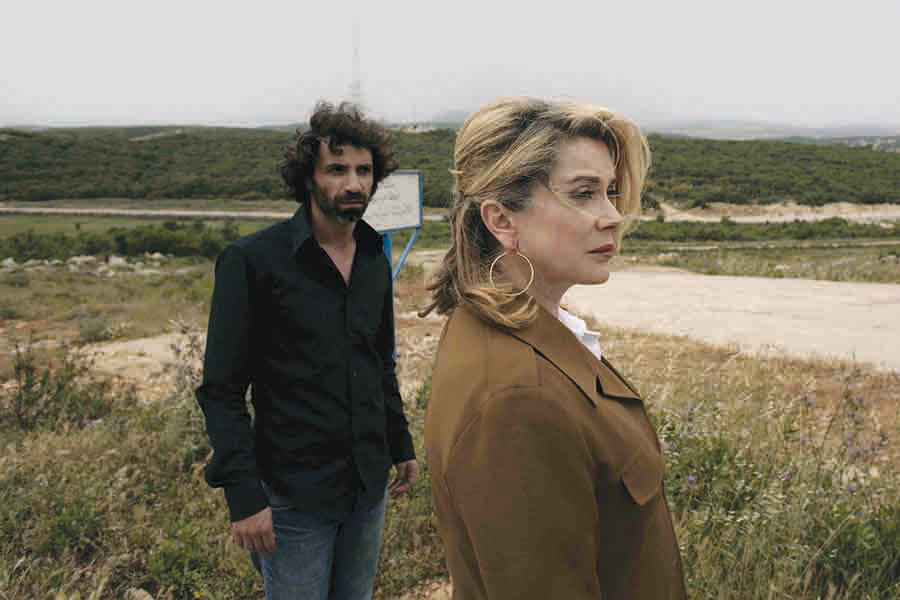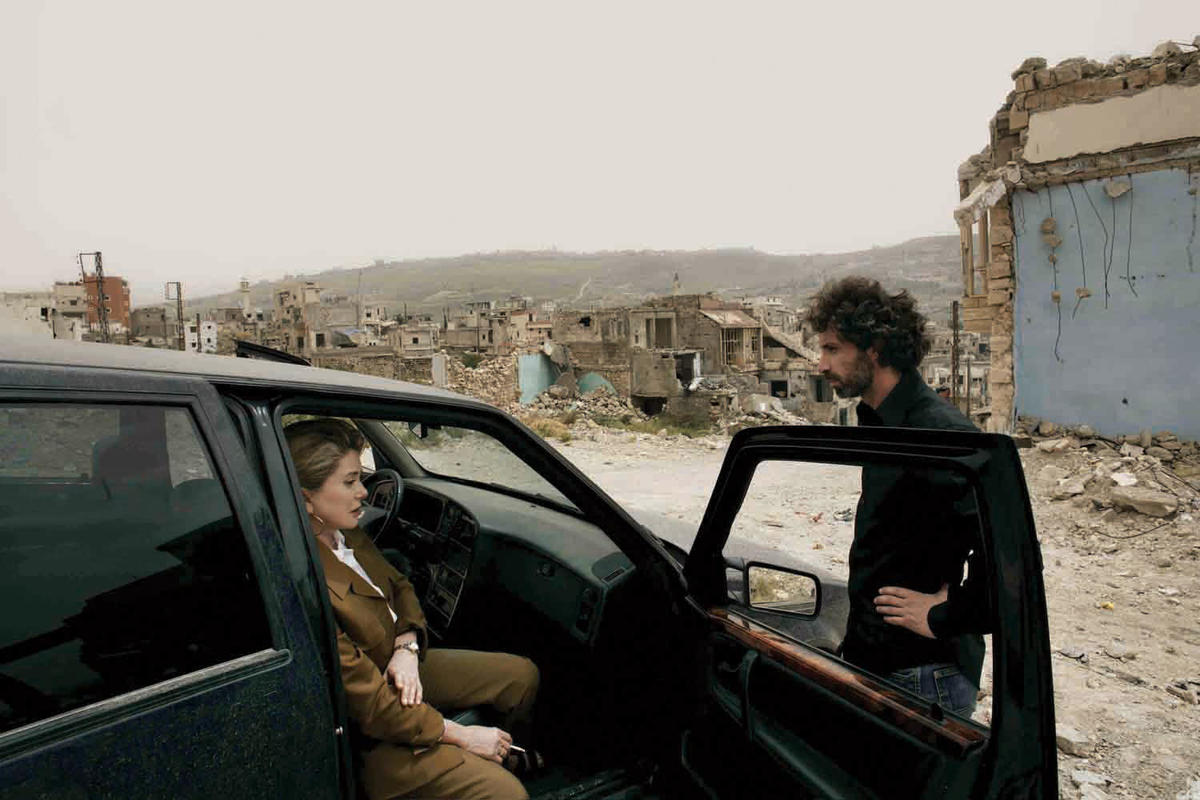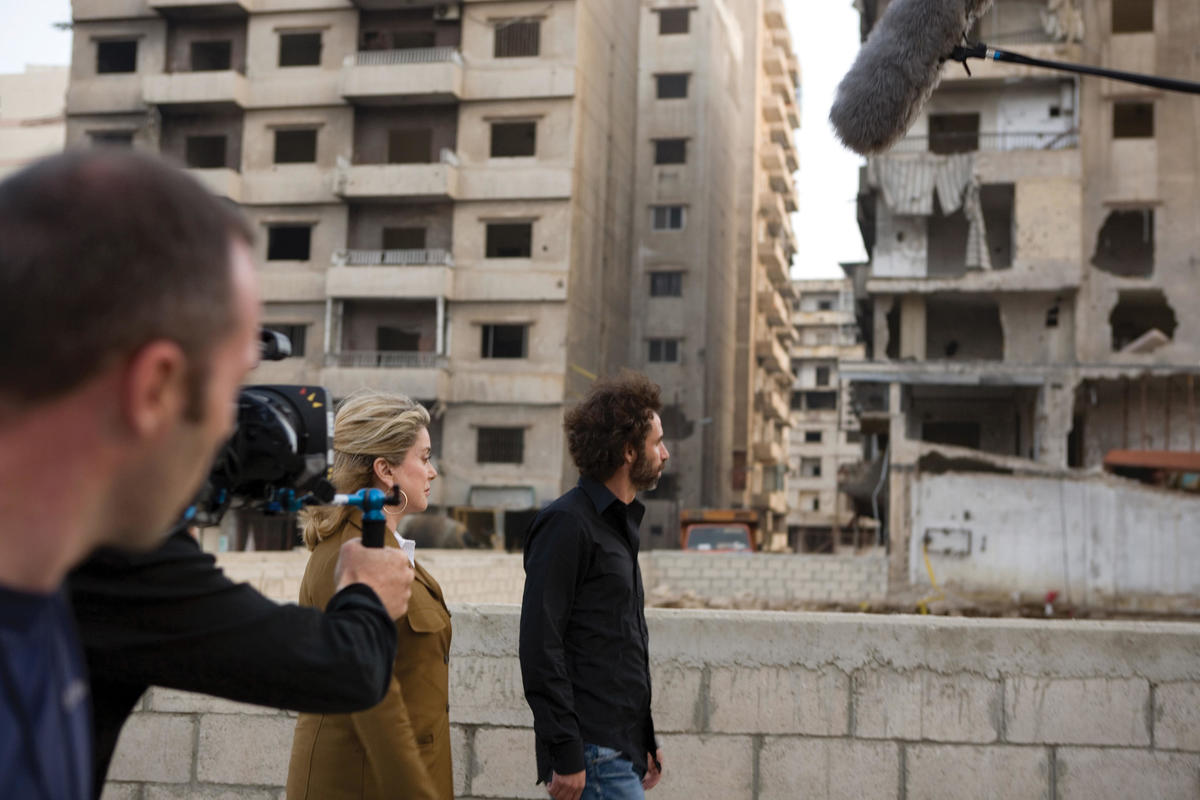
French screen icon Catherine Deneuve stands before a high-rise window looking down at Beirut’s hazy skyline, her back to the camera. Various apparatchiks of image-making crisscross the frame and hash out a plan to have “Catherine Deneuve” drive into Lebanon’s war-ravaged south with Lebanese actor “Rabih Mroué” (also playing himself), their day-trip filmed for posterity, Cannes, Canal Plus, etcetera.
An offscreen voice lists the array of logistical issues and hazards the project will encounter — UNIFIL, the Israelis, land mines, Hizbullah, Deneuve’s fame — and then stops to ask, fairly straightforwardly, why? Why does Mme Deneuve, in town for just a few days to attend some poorly explained gala, desire to embark on this foolhardy expedition?
“I want to see,” Deneuve responds, straightening her spine and gathering herself up to a height befitting a Gallic legend. As the camera stares out at a generic wide-angle shot of Beirut, she repeats herself, emphatically. “I want to see.”
So begins Je Veux Voir, the second feature-length film from Franco-Lebanese artists Joana Hadjithomas and Khalil Joreige. The duo is perhaps best known for minimalist hybrid documentary-videos. In Khiam (2002) they told the story of a notorious Israeli-sponsored prison in South Lebanon by presenting the testimony of ex-prisoners, who returned to the camp to describe the small acts of resistance by which they survived ten years in captivity. The Lost Film (2004) was a winning anti-whodunit, in which a print of the filmmakers’ first film, Around the Pink House (1999), is stolen in Yemen on the tenth anniversary of Yemeni unification, and the filmmakers, less outraged than curious, set out to discover just who in Yemen would care enough about their movie to steal it. See’s frame is a similar mix of large and small aspect ratios, the historical and the personal, with the addition of a novel frame: global celebrity. Call it Deneuvision.

The journey south (destination, the Israeli-Lebanese border) is a cagey mash-up of documentary and fiction. The leads play themselves, of course, and their interactions feel largely unscripted. They also feel largely unmotivated. Deneuve’s (and the film’s) statement of purpose strikes the ear as simultaneously grandiose and inadequate, despite its undeniable immediacy. She is known for her commitment to worthwhile and progressive causes, so her presence seems plausible enough, but the reasons for this trip remain obscure. At one point along their drive, Mroué asks Deneuve whether she plans to return to Lebanon one day. The starlet says nothing. The camera keeps running while Mroué waits for a response, but Deneuve is out of lines and there is nothing in her backstory to indicate how she should respond. All she can do is look out the window.
Looking out the window is actually the better part of valor here, as See is appropriately gorgeous to watch. Cinematographer Julien Hirsch wrangles consistently arresting images from the journey — shots of Beirut streets perched between demolition and reconstruction, the bombed-out town where Mroué grew up, a seaside dump where whole ruined cities seem to have been discarded. Hadjithomas and Joreige refuse to fill out their high concept with much in the way of incident; nor do they pretend that their central conceit will shed any light on either the actors’ or Lebanon’s inner life. There is a great deal of honor in this reticence. And with its broken fourth wall and reflexive narrative hijinks, its willingness to put its leads ever-so-faintly in harm’s way, See is also a riff on the celebrity travelogue, the French star on the sort of camera-strewn “fact-finding mission” usually reserved for UN special ambassadors like Angelina Jolie. See is, in a sense, a rejoinder to the egomania and dishonesty of such documentaries as I Am Because We Are, Madonna’s Excellent Malawian Adventure, which also screened at Cannes this year. No one learns anything of import in See; there’s no redemption or apotheosis, no geopolitical problem magically alleviated through the grace and intercession of celebrity. At the end, there is only Deneuve and Mroué. She meets him for the first time in the morning and that night introduces him as a friend, smiling her legendarily blank yet overpowering smile at him.
Although Deneuve’s face turns out to be See’s most filmed landmark, Mroué is the more intriguing character. The artist and occasional actor (he also appeared in the directors’ first feature, 2005’s A Perfect Day) wisely refuses to play the local avatar, deferring to Deneuve’s fame and demurring that he’s honored and curious to be taking the journey with her. He is charmingly neither starstruck nor indifferent. At one point, in a lovely set piece, the screen goes black and he recites her lines from Belle de Jour to her, first in French, then in Arabic. Mroué knows the lines best by their Arabic subtitles, and when Deneuve says that the lines sound beautiful in translation, the exchange takes on a sudden and thrilling intimacy. Talking about movies and things read on screens brings the two actors together at precisely the moment their own screen is blankest and most empty.

In the way of such things, though, Mroué’s refusal to stand in for his country leaves the Lebanese half of See’s duo with an even less appealing role to play: the chauffeur. A man the filmmakers describe as “our favorite actor” is in the main reduced to driving Deneuve around, while the Frenchwoman natters on about seat belts or asks questions (“What’s that?”). At one point she even dozes, and the camera drifts into a soft-focus reverie, leaving Mroué doubly alone as he drives down the road. He’s not so much isolated as absent, the fade-out tracking from Deneuve falling asleep directly to her waking, her point of view inviolate.
This problem of Mroué ultimately becomes the film’s problem as well. See never pretends or aspires to be anything beyond what it is — a document of two actors going on a drive down a somewhat melancholy road. There’s a great, bracing honesty in that simplicity, but there is also attendant risk. For all the archival and documentary pleasures associated with the road, Je Veux Voir is the kind of rigorously conceptual filmmaking that can just as easily be read about as, well, seen. Perhaps that’s the point. But one can only imagine the screening at Cannes, a roomful of Deneuves dozing while their talented and thoughtful Lebanese directors keep driving and filming in silence.